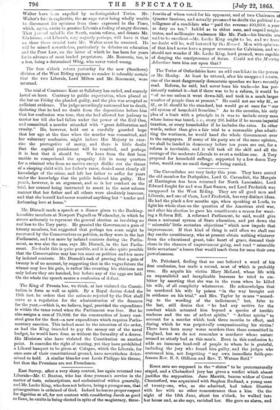Dr. Pritchard, finding that no one believed a word of
his first confession, has made a second, most of which is probably true. He acquits his victim Mary McLeod, whose life with an unparalleled and inexplicable baseness he tried to em- bitter by asserting that she was in the room when he killed his wife, of all complicity whatsoever. He acknowledges that he murdered his wife by poison " in the way brought out in evidence on his trial," and Mrs. Taylor by means "accord- ing to the wording of the indictment," but, false to the last, still denies that " he had any motive for the conduct which actuated him beyond a species of terrible madness and the use of ardent spirits." "Ardent spirits" to account for a murder which, took three months to effect, and during which he was perpetually compassionating his victim! There have been many worse murders than these committed in England, but we do not remember a murderer whose nature seemed so utterly bad as this man's. Even in this confession he adds an immense bead-roll of people to whom he is grateful, including the jury who found him guilty, and the judges who sentenced him, not forgetting " my own inunediate faith-pro- fessors Rev. R. S. Oldham and Rev. T. Watson Reid."






























 Previous page
Previous page